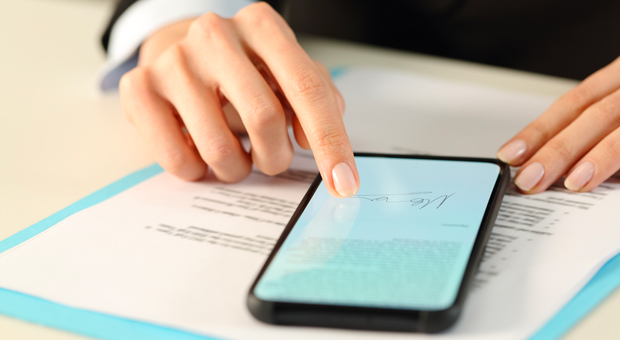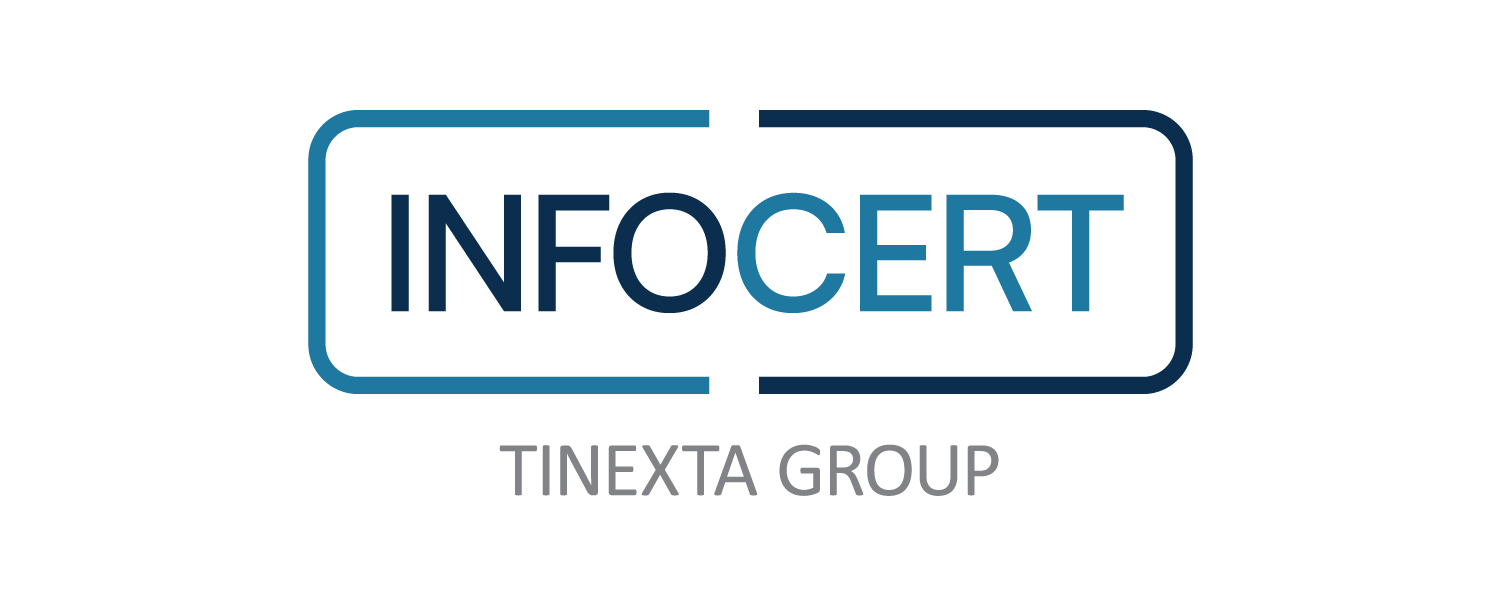Create a signature online
GoSign – the platform for individual digital signature processes
Sign documents quickly and get them signed – with GoSign. Create individual and resource-saving signature processes according to your requirements and workflows. You can also send documents to your contractual partners in just a few minutes and receive them back signed immediately. No matter whether you want to sign a PDF, Word or Excel file – GoSign from our partner InfoCert is the right solution for you. Create a signature online now!
Create a signature online – easier than ever before
Sign regardless of the format of the document, the number of parties and devices: Signing with GoSign is flexible and adapts to your needs and circumstances. You create the signature process with a few clicks, your contractual partners are prompted by email to create a signature online and do not need an additional GoSign subscription.
Sign any type of document
- Excel
- Word
- PowerPoint
- Txt files
- Graphic formats such as jpg and png
- Web formats like html
Sign flexible & get signed flexible
- Business partners
- Clients and customers
- Employees
- Applicants
Device-independent signing
- on your own PC with the desktop version installed
- on the PC from anywhere via the browser
- or on a smartphone with our app
Design the signature process as you need it
Should your contractual partners sign on the same document? Should they sign at the same time or one after the other? In which order should the persons sign? You can define this individually for each document with just a few clicks. Whether one contractual partner with a single Qualified Electronic Signature or ten contractual partners with 20 required signatures of different signature levels – you decide!
More digitalisation & sustainability thanks to GoSign
Say goodbye to printing, scanning, long waiting times and unnecessary postal routes! With GoSign you optimise your processes and also avoid mountains of paper and full filing cabinets. In this way, you and your company take a further step towards more sustainability and digitalisation.

Select the appropriate signature level
Whether a Simple Electronic Signature (SES) for a protocol, an Advanced Electronic Signature (AES) for a sales contract or a Qualified Electronic Signature (QES) for a credit agreement – with GoSign you have the choice.
You need different signature levels in the same document? No problem! With GoSign, you can also define exactly where in the document which contractual partner should sign with which signature level. Even in one document, mixing different signature levels is no problem.
Simple Electronic Signature (SES)
For processes or concerns that are associated with low liability risk. However, the evidential value of the Simple Electronic Signature (SES) is low because it does not require identification. Nevertheless, it is used in a large number of business processes.
Advanced Electronic Signature (AES)
For processes with calculable liability risk. Although the identity of the person signing can be confirmed by identification at the “substantial” level, the Advanced Electronic Signature (AES) is not equivalent to a handwritten signature.
Qualified Electronic Signature (QES)
The signature with a legal formal requirement or high liability risk. The identity of the person signing must be confirmed by digital identification. In contrast to the SES and AES the Qualified Electronic Signature (QES) is equivalent to a handwritten signature. In addition, it is – also according to the eIDAS Regulation – the most secure type of electronic signature.
Regulatory requirements
At AUTHADA we guarantee the highest level of security and protection for your customers’ data. AUTHADA’s solutions are compatible with numerous regulations and laws and in some cases exceed the legal requirements for security and data protection.
German Money Laundering Act (GwG)
An GwG-compliant identification can be implemented with the help of electronic proof of identity (Section 18 of the German Identity Card Act) and the electronic residence permit (Section 78 (5) of the German Residence Act), in accordance with Section 12 (1) sentence 1 No. 2 GwG. The obligations to preserve records resulting from this identification procedure (as per Section 8 (2) sentence 5) require the “service and card-specific marking”, which we provide with the data for identification.
German Telecommunications Act (TKG)
The electronic proof of identity (eID), the residence permit and the eID card for Union citizens are permissible procedures for the identification of natural persons (e.g. for the activation of SIM cards) according to Section 111 TKG. The retention obligations are analogous to Section 8 (2) sentence 5 GwG. Accordingly, TKG-compliant identifications can be carried out with AUTHADA ident and onsite, for example, when concluding a mobile phone contract or in the branch when purchasing a SIM card.
German Identity Card Act (PAuswG)
According to Section 18 and Section 18a of the PAuswG (Section 78 (5) of the AufenthG for residence permits and Section 12 of the eIDKG for eID cards for Union citizens), reading the electronic proof of identity (eID) is a reliable process for reading ID card data online and on site. Before the data is read out, it is verified whether the person presenting the eID card is the cardholder. Before the data is read out, it is checked whether the person presenting the ID document is also the cardholder. In the case of on-site reading, this is done by a employee on site; in the case of online identification, it is done with the help of the personal ID PIN.
eIDAS Regulation
The eIDAS Regulation regulates electronic identification and electronic trust services all over Europe. The German eID has already been successfully notified and will be able to be used for identification in the EU in the future. The implementation of the eIDAS Regulation is outlined in the Trust Service Act (VDG). Moreover, as per eIDAS, a remote signature can be initiated via the German eID.
